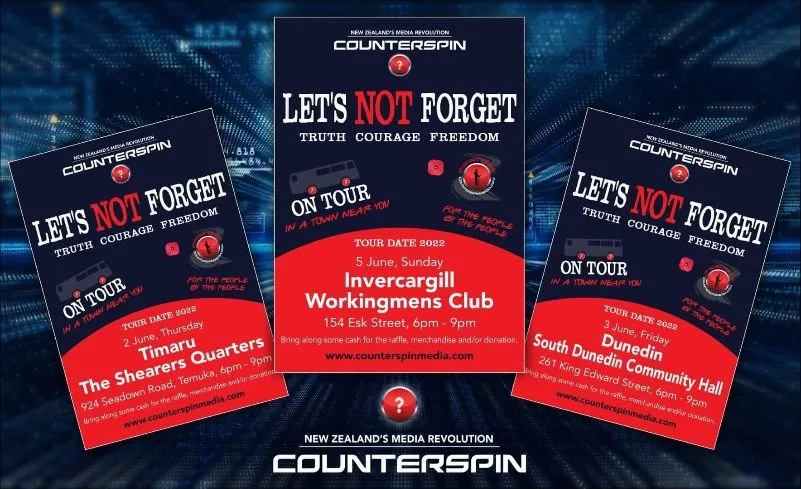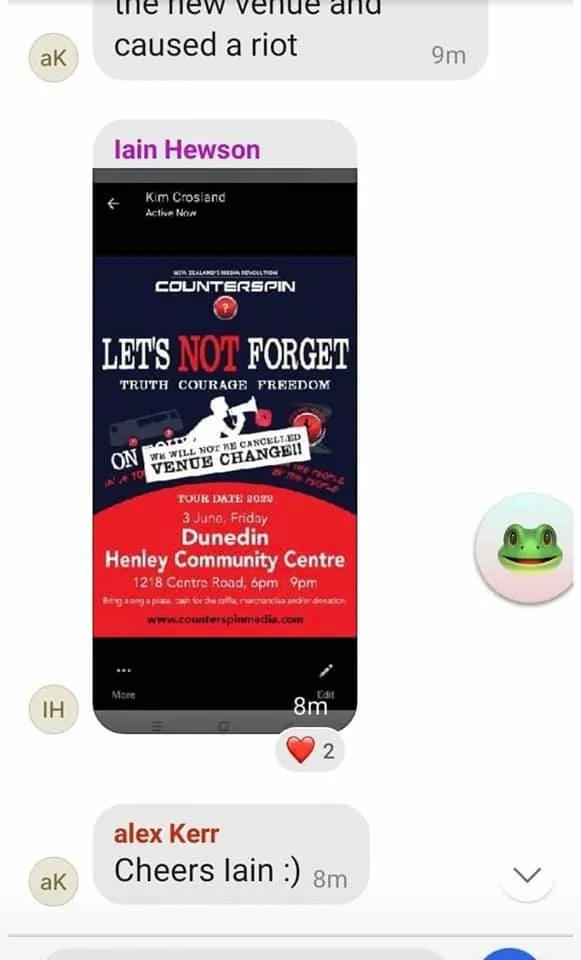Counterspin can't stand “Cancel Culture”
Mark Honeychurch - 7th June 2022
A couple of weeks ago I wrote about my visit to Counterspin’s travelling roadshow (maybe circus is a better term?), but I figured that everyone might want some background - and an update on how their tour’s going.
Counterspin Media is an “alternative” media organisation that has been running for just over a year now, spreading misinformation via their online videos. The organisation is run by Kelvyn Alp (who has a colourful history in New Zealand), and his girlfriend Hannah Spierer (who until recently was spreading conspiracy nonsense online under the pseudonym “Sarah Speaks”). Kelvyn’s Wikipedia page is an eye-opener, as his history includes creating a group called the “Armed Intervention Force” - supposedly a team of mercenaries, who later rebranded as a paramilitary force that at one point declared war on the government and wanted to destroy our banking system.
With a history like that, it’s not surprising that Kelvyn is still up to no good. The breadth of nonsense promoted by his current soapbox, Counterspin media, is breathtaking:
-
They have hosted an ex-lawyer who told people how they could declare any piece of land in New Zealand as their own sovereign country, separate to New Zealand laws and jurisdiction. Obviously, this is not good advice, and if you try this as a way to avoid paying taxes, you’ll eventually end up having to pay both your outstanding taxes and fines for non-payment. I’ve read about the people who have tried to use this in court in NZ, and the judges so far have been having none of it.
-
They have promoted a pretty horrific rumour that “global elites” are planning a “great reset” of the population, to bring it down to something like 500 million people (as the Georgia Guidestones talk about). Supposedly the pandemic may be a way they are managing this. This particular conspiracy is often linked to shadowy Jewish figures and stinks of anti-semitism.
-
Kelvyn is obsessed with transhumanism, and thinks that tech companies are planning to augment everyone with Artificial Intelligence - honestly, if this was possible I’d be at the front of the queue!
-
And, of course, they give a platform for others to spread dangerous misinformation. In just one episode, Kelvyn and Hannah interviewed:
-
Dr Guy Hatchard, whose PhD is from the “Maharishi University of Management” in the US that offers ““consciousness-based education”. He’s positioned himself as an expert on pandemics and vaccines, even though he’s neither qualified nor experienced.
-
Alan Simmons & Sue Grey, co-leaders of the Outdoors “& Freedom” party, which is anti-1080, anti-5g, anti-fluoride, anti-vaccine, etc. (They’ve added freedom recently, to try and capitalise on the idea that the conspiracy movement in NZ is fighting for everyone’s freedom).
-
Amy Benjamin, an American law lecturer who until recently worked at AUT (Auckland University of Technology) and has been telling people that the Christchurch attack was a “false flag” perpetrated by the government, and the pandemic is a medical “false flag”.
As for their tour, Counterspin reached Dunedin a few days ago, but they had some bad news on the way there. Some good-minded citizens had contacted their venue and pointed out to them that Counterspin often promotes some pretty scary far-right ideas, and the result was that their venue cancelled on them:
Although they managed to organise a backup venue, it wasn’t long before they too cancelled on Counterspin:
The event did go ahead at a third venue, 30km outside of Dunedin (a half hour drive) - but only about 50 people turned up. The speakers talked about how our government’s plan is to keep us all enslaved, the UN’s secret agenda, the threat of communist propaganda on TV and in education, and other non-issues. I really do worry for these people, that they see their enemies everywhere they look. It’s got to be horrible to live a paranoid life like this.
Here are screenshots showing the three different venues for Dunedin:



Since the event, Counterspin videos have railed against “Cancel Culture”, with titles such as:
-
YOUR VOICE WILL NOT BE CANCELLED!
-
CANCELLED AGAIN, BUT THE SHOW MUST GO ON!
-
CANCEL CULTURE STRIKES AGAIN - THE PEOPLE vs THE SWAMP PARASITES
It seems to me that “cancel culture” is a phrase being used by some people to denigrate those they disagree with these days, like recent pejorative use of the word “woke” (Fox news and other conservative media platforms may well be driving this trend). As a skeptical activist I think that “cancelling” odious events by attempting to de-platform them is an acceptable form of protest. By odious events, I mean events where harmful ideas are likely to be spread - the promotion of an abusive religious cult, or of ideas like extreme right ideologies or dangerous pseudoscientific medical advice. And de-platforming in this instance would be pressuring a venue not to host an event.
As far as I’m concerned, it’s up to a venue to choose whether or not to promote dubious ideas through allowing these kinds of events to go ahead - the people complaining don’t make a decision of whether to cancel or not, the venue owner does. Efforts to de-platform are a way of alerting organisations about issues they are likely not aware of already - much like the kinds of complaints we make to the Advertising Standards Authority or MedSafe at our regular Skeptical Activism meetings in Wellington are just a case of us alerting the relevant organisations of an issue they may choose to take action on. It could even be seen as a civic duty to warn venues about speakers who are spreading dangerous ideas.
Of course, if a de-platforming attempt is successful, it doesn’t stop someone from spreading their ideas. They can speak somewhere that restrictions usually don’t apply (such as a council owned venue, a public area, or a privately owned property owned by someone who is sympathetic to the views being espoused), spread their ideas in a way other than speaking publicly (like posting on a blog, publishing a book or starting an online video channel), or even consider critically examining whether their ideas have merit, and choosing to change their mind if they find that their message is harmful or lacks the element of truth.